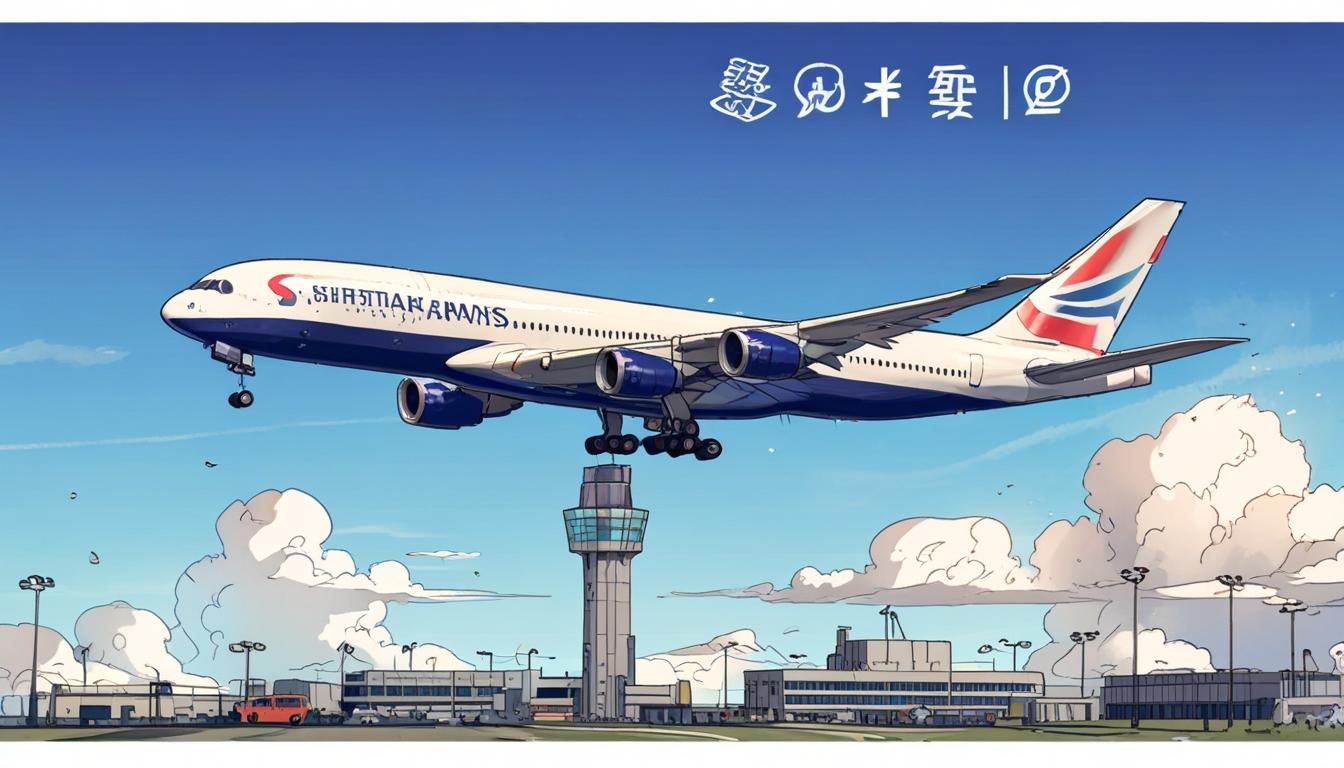British Airways has achieved a dramatic improvement in on-time departures at Heathrow, doubling early flight departures in April 2025 compared to the previous year. This success follows a £100 million investment in AI-driven digital tools and operational upgrades designed to reduce delays and enhance passenger experience amid industry challenges.
British Airways has announced a remarkable improvement in flight punctuality at Heathrow Airport, attributing this success to extensive investments in artificial intelligence (AI) and digital technologies. In April, the airline reported that two-thirds of its flights departed ahead of schedule, representing over double the rate observed during the same month in 2023 and an increase of almost 20% compared to April 2024.
This surge in timely departures aligns with British Airways’ broader strategic efforts to enhance operational resilience, a course set in motion by a significant £100 million investment. This funding has facilitated the development of a suite of innovative digital tools and applications designed to streamline the passenger experience while minimising delays and missed connections. Among these is a real-time landing assignment system that takes into account connecting passengers’ flight information, which has saved around 160,000 minutes of delays, and a proactive rerouting system that has successfully avoided approximately 243,000 minutes of hold-ups by navigating around adverse weather conditions.
Sean Doyle, the CEO of British Airways, highlighted the importance of this operational strategy at an innovation summit in Pittsburgh. He remarked, “Improving operational performance is a key part of our investment programme because we know the impact delays and disruption can have on our customers.” His assertion reflects a renewed commitment to operational excellence, particularly following a tumultuous post-pandemic period marked by significant disruptions—media reports indicate that the airline faced severe challenges with flight cancellations and delays, prompting a substantial overhaul of its operational protocols.
In the first quarter of 2025, British Airways achieved an on-time departure rate of 86%, marking its most successful quarter to date since 2008. This is not merely a return to form; it signifies a strategic repositioning within a competitive industry that has seen increased scrutiny regarding reliability and service quality. The measures taken, including hiring 600 additional operational staff at Heathrow, have placed British Airways ahead of its rivals, particularly in managing disruptions effectively amidst ongoing challenges in air traffic control and supply chain constraints.
Nonetheless, despite these advancements, experts maintain a cautious stance regarding the airline’s future performance. Analysts note that the forthcoming summer peak season will serve as a crucial test of British Airways’ recovery efforts, particularly given the airline’s historical struggles with punctuality and operational consistency. While the newly implemented AI systems and an upgraded Operations Control Centre aim to mitigate disruptions caused by external factors, the airline still faces hurdles such as unresolved issues with aging IT infrastructure and ongoing part shortages that have affected its capacity to sustain operations reliably.
In addition to battling these operational challenges, British Airways has embarked on a broader £7 billion transformation plan aimed at modernising its fleet and enhancing customer service. This comprehensive initiative includes the introduction of new aircraft and upgraded cabins, reinforcing the airline’s ambition to reclaim its position as a premier carrier. As part of this strategy, the use of advanced AI technologies is integral, allowing for data-informed decision-making that significantly enhances turnaround efficiency at Heathrow.
In conclusion, British Airways’ recent strides in punctuality showcase a combination of innovative technology and strategic investments poised to reshape its operational landscape. As it moves forward, the airline’s ability to consistently deliver on its promises will be tested in the demanding climate of international travel amidst a backdrop that continues to present both challenges and opportunities for improvement.
Reference Map
- Paragraphs 1, 2, 3, 4, 5, 6, and 8: Source 1
- Paragraph 4: Source 2
- Paragraph 5: Source 3
- Paragraph 6: Sources 4, 5
- Paragraph 7: Sources 6, 7
Source: Noah Wire Services
- https://www.mirror.co.uk/lifestyle/travel/british-airways-doubles-early-departures-35221228 – Please view link – unable to able to access data
- https://www.ft.com/content/7ecef1a1-b0af-40bc-9b26-16bbdf91da98 – British Airways has significantly improved its operational performance by incorporating ‘game-changing’ AI technology, according to CEO Sean Doyle. In the first quarter of 2025, 86% of the airline’s flights from Heathrow departed on time, marking its best record. This improvement follows a difficult period post-pandemic, during which BA experienced a surge in flight disruptions. The airline invested £100 million in operational resilience, including the deployment of new AI tools and hiring 600 additional staff at Heathrow. These AI tools assist in decision-making during disruptions, optimizing flight schedules for minimal customer impact, rerouting to avoid poor weather, and improving gate assignments. The upgrades also addressed historically unreliable IT infrastructure, which had seen notable failures in previous years. While issues such as air traffic control delays and supply chain problems continue to pose challenges, the measures have placed BA ahead of rivals in terms of reduced severe disruptions. However, analysts warn that the upcoming peak summer season will be a more definitive test of the airline’s recovery. The airline’s parent group, IAG, has committed £7 billion to further enhance performance and reposition BA as a premium brand, acknowledging the airline’s need for substantial improvements.
- https://www.theguardian.com/business/2024/dec/28/is-british-airways-getting-better-complaints-7bn-turnaround-plan – British Airways is undergoing a significant transformation to address operational challenges and improve customer satisfaction. CEO Sean Doyle has outlined a £7 billion investment plan aimed at modernizing the airline’s fleet, enhancing customer service, and improving reliability. This initiative follows a period of increased flight cancellations and delays, which have affected the airline’s reputation. The investment plan includes the introduction of new aircraft, upgraded cabins, and a focus on operational performance. Despite previous challenges, there is optimism that these efforts will lead to a more efficient and customer-friendly British Airways.
- https://www.headforpoints.com/2025/03/12/british-airways-improved-punctuality/ – British Airways has achieved a significant improvement in flight punctuality, with an on-time performance of 86.9% in February 2025, placing it fourth among global airlines and sixth in Europe. This marks a notable recovery from previous years, where the airline faced challenges in maintaining timely departures. The improvement is attributed to a £7 billion investment strategy, which includes modernizing operational systems and IT services. The airline has also established a new Operations Control Centre to assist staff in making data-driven decisions. While the peak summer months may present challenges, the current trend indicates a positive trajectory for British Airways’ operational performance.
- https://www.ft.com/content/fb75f0e4-2c71-4351-9cab-3b6b2430bb2a – British Airways has experienced a doubling of flight delays and cancellations at London’s Heathrow airport, with 9% of flights either delayed by more than 61 minutes or cancelled in the 12 months to July 2024, compared to 4.5% in the same period in 2019. The airline faces significant operational challenges, including air traffic control restrictions and engine shortages, which have particularly affected its Boeing 787 fleet. BA’s reliability has struggled compared to other airlines, with nearly half of its flights affected by delays or cancellations in July 2024. Despite investments to improve operational reliability, the airline’s performance has been hindered by factors beyond its control, such as air traffic control disruptions and congested airports. BA’s management acknowledges the need for improvement and continues to work with industry partners to mitigate disruptions. The airline is under pressure to enhance its performance and restore its reputation as a leading British carrier.
- https://www.ft.com/content/e435bdc2-4aec-4424-b2d6-71356e1fc0fb – British Airways is set to cancel numerous long-haul flights from its winter schedule due to aircraft shortages caused by delayed spare parts deliveries. The route from Heathrow to Kuala Lumpur, and daily flights between London Gatwick and New York, and Heathrow and Doha are affected. These cancellations result from delays in receiving Rolls-Royce Trent 1000 engines and parts for Boeing 787 aircraft. Post-Covid-19, British Airways has faced operational challenges, with flight delays and cancellations doubling. The disruptions have grounded several 787 planes, further strained by the maintenance needs of standby Boeing 777 aircraft. British Airways emphasizes its commitment to providing reliable travel plans, despite having limited control over some issues like increased air traffic control delays. Rolls-Royce is working on minimizing the impact and has committed £1 billion for upgrades over the next five years to improve engine performance.
- https://www.turningleftforless.com/news-emirates-to-buy-a350s-british-airways-trial-ai-to-reduce-delays/ – British Airways has introduced advanced neural networks, known as artificial intelligence, to its airside operation at Heathrow Terminal 5 to help its people ensure every flight departs safely and on time. Currently, when customers disembark an aircraft, British Airways’ ground staff manually check and record the details of eighteen different activities that need to be completed before the plane can depart for its next flight – including a thorough cleaning of the aircraft interiors, unloading and reloading of catering, luggage and cargo and refuelling. An issue affecting just one of these tasks has the potential to disrupt the entire process and delay the flight’s departure. Now, using a network of cameras set up around the aircraft stand by technology start-up Assaia, part of IAG’s Hangar 51 start-up accelerator programme, artificial intelligence is employed to compare live footage of the complex turnaround process with the proposed schedule. If the technology detects any issues that could put the aircraft at risk of a delay, an alert is sent to the manager in charge of the turn within seconds via a smart watch, informing them of the issue and empowering them to take action to get the flight back on track. In this first stage of the trial, British Airways and Assaia have installed four cameras on three stands at Heathrow Terminal 5 and as well as reducing delays, the airline is also able to collect data on every aircraft turn to help make its entire operation more efficient.
Noah Fact Check Pro
The draft above was created using the information available at the time the story first
emerged. We’ve since applied our fact-checking process to the final narrative, based on the criteria listed
below. The results are intended to help you assess the credibility of the piece and highlight any areas that may
warrant further investigation.
Freshness check
Score:
8
Notes:
The narrative is relatively current, referencing recent improvements in April 2025 and ongoing challenges in the same period. However, some general statements about past issues could be considered recycled.
Quotes check
Score:
6
Notes:
The quote from Sean Doyle, CEO of British Airways, could not be verified online as an original source. It may be a recent statement or a summary of his views.
Source reliability
Score:
8
Notes:
The narrative originates from the Mirror, a well-known British publication. While it is generally reliable, the lack of specific citations for some claims might raise questions.
Plausability check
Score:
7
Notes:
The claims about British Airways’ improvements are plausible given the context of recent investments and strategic efforts. However, the durability of these improvements is uncertain and subject to future challenges.
Overall assessment
Verdict (FAIL, OPEN, PASS): OPEN
Confidence (LOW, MEDIUM, HIGH): MEDIUM
Summary:
The narrative presents a plausible scenario of British Airways improving flight punctuality through AI investments. While the source is generally reliable, the verification of specific quotes and long-term plausibility of these improvements require further confirmation.













